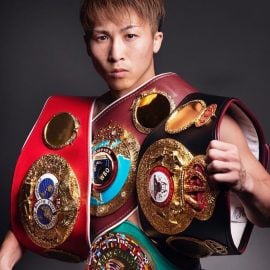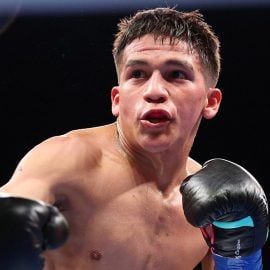Oscar De La Hoya blog: Fight week

Oscar De La Hoya was in as many mega-fights as any boxer of his generation. In his blog this week, in the days leading up to the Floyd Mayweather Jr.-Juan Manuel Marquez fight on Saturday in Las Vegas, he describes what fight week is like.
When you close camp that final day of training, you feel relieved. The hard work is over. Then you start thinking about making weight; you start looking forward to the stare down at the press conference and weigh-in, eye to eye for the last time before you get into the ring.
Once you get to Vegas, the butterflies get bigger and bigger. That’s when both the nerves and adrenaline start to kick in. Then, at a certain point, you start to get anxious. You start feeling moody and your attitude changes. Everything bothers you — the fact you have to make weight, can’t eat the same, have to shed that last few pounds.
The first half of the week, the time goes fast. The last three days feel like an eternity. You have your media obligations, the weigh in, and all you want to think about is fighting. That’s why everything bothers you. Everything ticked me off; everything pissed ÔǪ me ÔǪ off. I just wanted to fight already. It never showed, though; I knew how to disguise it.
The stare down is just a mental thing for the fighters. The fighters feel as if that’s the first round. If you win the stare down, OK, you have one up on your opponent. You ask yourself: Is he looking back into my eyes? Does he look nervous? Is he smiling? Is he serious? It tells you a lot.
Sometimes you get an edge, sometimes you don’t. I remember one time I got an edge. It was my fight against Fernando Vargas. He looked strong, confident. I remember it clearly. We were on a wide stage at the press conference, sitting on opposite ends, so we didn’t have a normal stare down. He was flexing, he took his shirt off, he looked like Mr. Universe.
I saw him over there and I thought, “How can I burst his bubble?” Then I stood up, stuck my chin out and pointed to it. I saw his head go down. And I thought, “I got him.”
The opponent you’re facing also plays a role in fight week. If your opponent appreciates the opportunity you’ve given him, if he doesn’t talk badly about you, it’s one thing. If he trash talks, it becomes a whole different thing. And then there are unusual opponents.
I remember fight week when I fought [Ghanian] Ike Quartey. He was an unknown fighter yet had an entourage, followers from Africa. And he had drums playing. I thought, ‘This is a confident fighter.’ I remember feeling a bit worried because this guy was a mystery. I was nervous all fight week. I didn’t study tapes of him. I kept thinking, ‘Who is this guy? Why is he so confident? The drums. I thought, ‘He must be the real deal.”
Fight week for my first fight with Julio Cesar Chavez also was unusual. I had received a lot of threats throughout camp, death threats. I was worried not only about the fight; I was worried about the fans. What are they going to think if I beat Chavez, the Mexican idol? And I had the threats to deal with. I had a lot to deal with. I was able to block everything out, though, every distraction, every emotion. I prepared myself in Big Bear, Calif. I didn’t think of anything but my performance.
That helped me produce my best performance. I call it my perfect fight. I felt like I was floating, like things were flowing perfectly. Everything was fast and strong. I was able to take myself into a zone that only a handful of boxers — athletes — are able to experience. I remember afterward, when I got back to my room with the weight off my shoulders, I just broke down. It was pretty intense. Every fighter has different emotions during fight week. If you can’t control it, it controls you. It takes you over.
An example of that is our young fighter Victor Ortiz. It took him over when he fought Marcos Maidana. I’m sure it was overwhelming for him, when everybody has such high expectations of you. It was probably our fault, too, hyping him as the next Golden Boy. That’s a lot of pressure. The great thing is that he’ll be back. We’ll see how he does when he’s not being hyped as the next Golden Boy.
The weigh-in is a huge relief — once it’s over. Once you have your first drink of water or juice after the weigh-in, you’re a happy camper again. It’s a big relief. Just munching on little foods hear and there makes you less grouchy. Once you have that food or drink, then you almost become yourself.
On the day of the fight, you want to feel relaxed. That depends on how training went, though. If you trained 100 percent, then you want to fight. You want to get inside the ring as quickly as possible. If you have doubts in your mind, it’s different. Maybe camp didn’t go right or maybe there were other problems in camp. And no one knows this. Fighters keep a lot to themselves. They don’t expose weaknesses. They don’t expose an injury or missing a few days of running because your leg hurts. On fight week, though, you think about it. “OK, I sparred 80 rounds. I should’ve sparred 90. I felt good running. I should’ve run more miles.”
Once you get to the last few hours before you go into the ring, once everything winds down, then it just becomes a blur. Everything happens so fast. You hear, “You have 10 minutes to go out to the ring.” Then you’re in the ring. Then you’re fighting. Then it’s over. It becomes a blur. You don’t think about it. You don’ think about anything except getting into the ring and fighting?
Oscar De La Hoya’s blog appears once a week.















